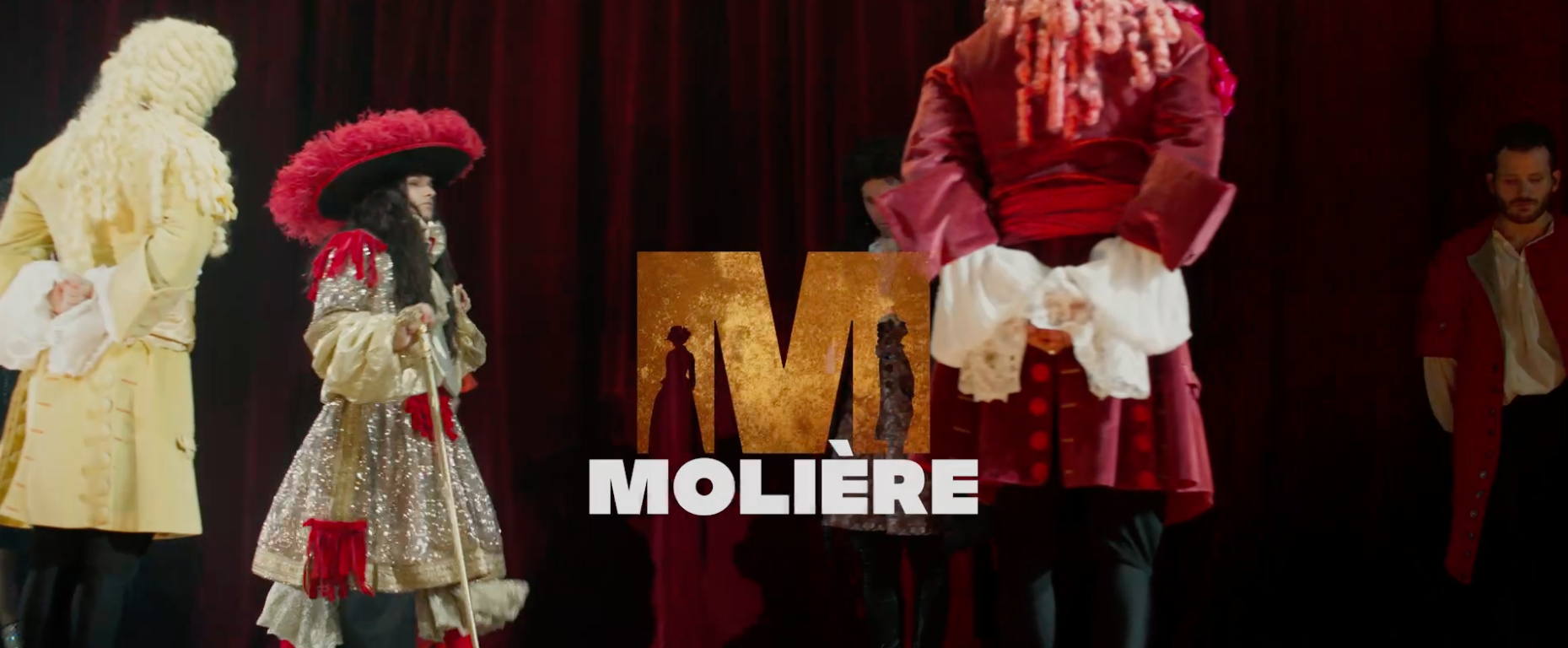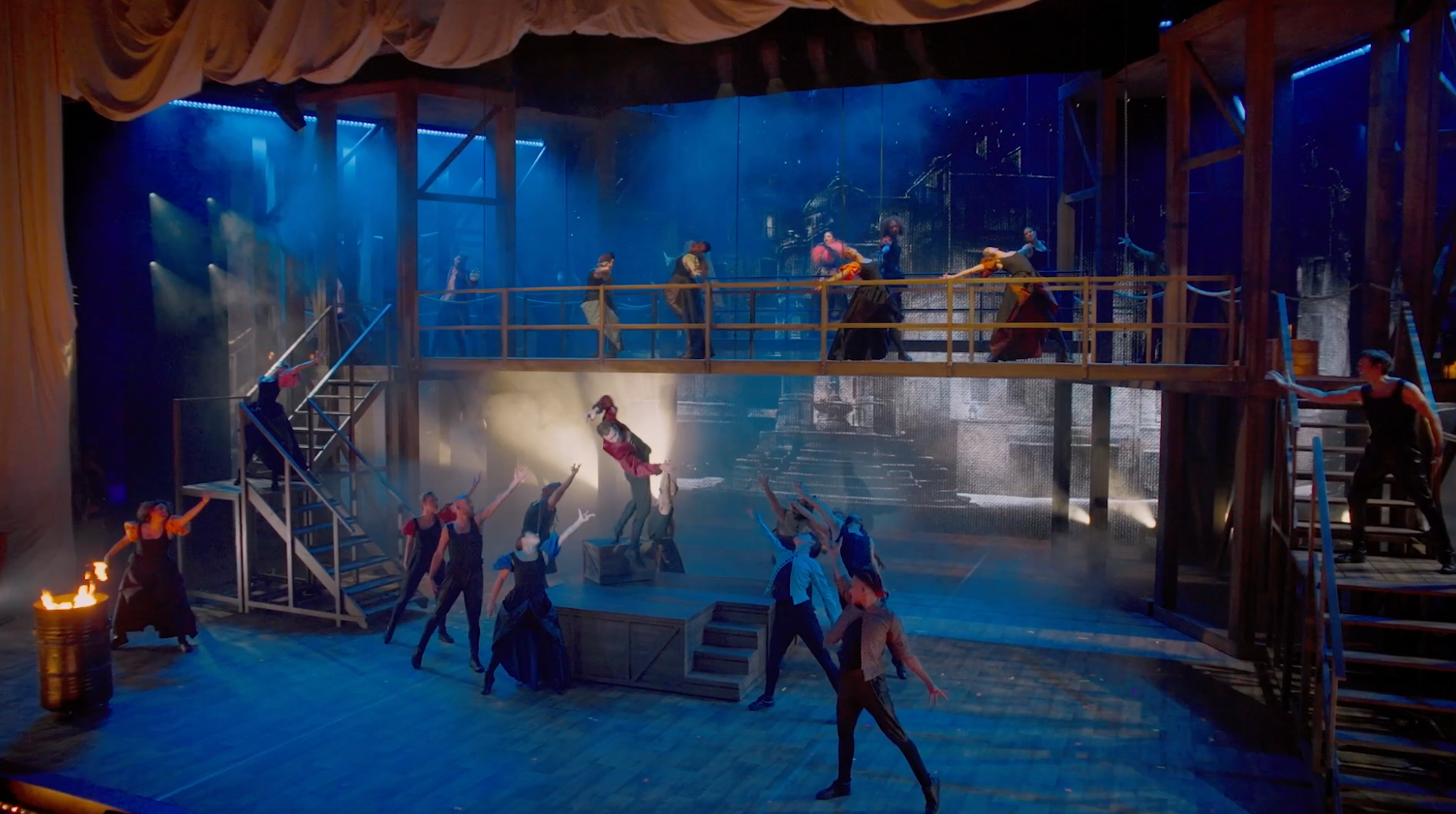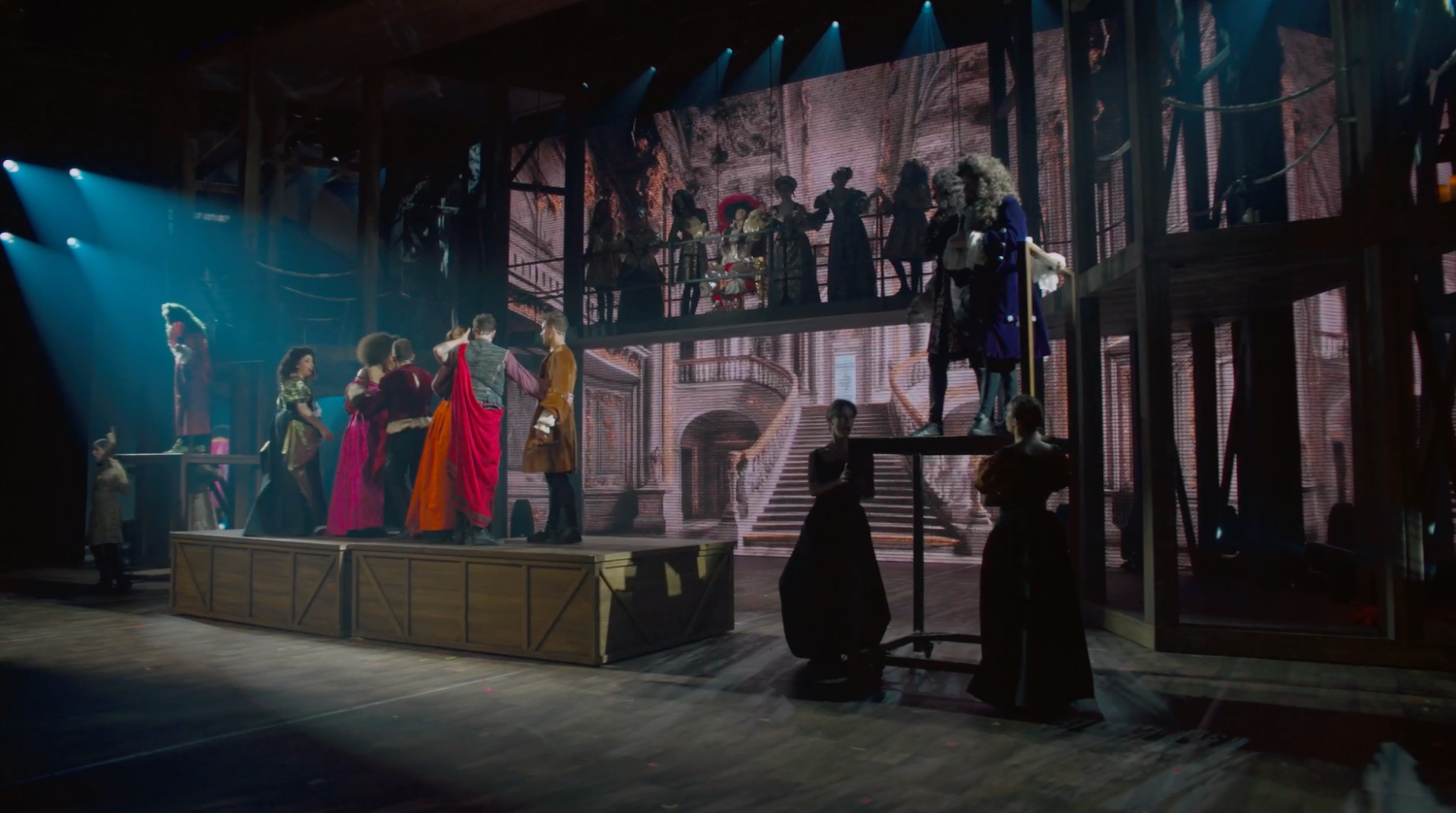
Molière : l’Opéra Urbain

The incredible story of a genius
Molière, l’Opéra Urbain is a new musical which joins singers, slammers, dancers ,actors and musicians in a set and costumes from the 17th century.
The show will narrate the extraordinary life of Jean-Baptiste Poquelin, also know nas Molière, a man who gave up to material comfort and the prestige of King’s decorator to create with his wife at theatrical company.
But the way of success will be very long and the obstacle will be abondant.
Molière will become a free author who will revolutionize the writing of comedy.
He paid lot of his liberty by fighting the hypocrisy of society, and the adversity of numerous enemies.
Molière : l’Opéra Urbain
ACT 1
As the play opens, we find ourselves in the year 1642, when Jean-Baptiste Poquelin is 20 years old. The man destined to change his name to Molière is the son of a family of master tapissiers (or upholsterers), inheriting the prestigious and comfortable position of Official Tapissier at the Royal Court from his father. But the young Jean-Baptiste had only one idea in mind, and that was to follow his dream: comedy.
After finishing his studies, Jean-Baptiste met a talented young actress, and familiar figure on the Paris scene, by the name of Madeleine Béjart… and fell hopelessly in love with her. It was an encounter that persuaded Jean-Baptiste to give everything up so he could pursue his passion for the theatre by Madeleine’s side. There was still one major obstacle facing him, however: Jean-Baptiste had to tell his father the news that he was abandoning his career as a tapissier. A heated argument followed, with the relationship between father and son on the brink of collapse. And yet, Jean Poquelin was an austere but kindly father, and he eventually – though reluctantly – gave in to his son. Jean-Baptiste’s younger brother inherited the prized role of Tapissier to the King in his place.
Contemporary society considered the profession of acting immoral, and actors had no social status and lived in precarious conditions. The church excluded them from the community of the faithful and refused to give them the sacraments.
King Louis XIII was to be no more in a few months, and Louis XIV, the young heir apparent, was only 5 years old. The boy’s mother, Anne of Austria, became regent of the realm alongside her minister, Cardinal Mazarin.
Although still vehemently opposed to his son’s chosen vocation, Jean Poquelin gifted him an advance on the inheritance of his mother, who had died a few years earlier. When this money was combined with Madeleine Béjart’s savings, the couple were in a position to found the Illustre Théâtre company. In spite of their enthusiasm, the theatre’s first season proved to be a failure, and the debts and liabilities began to mount. The company ended up borrowing money it was not able to repay, and it was Jean-Baptiste, now known as Molière, who was guarantor. The company was taken to court before being wound up with Molière thrown into prison. His father intervened once more, settling the bail for his son’s release. And, even though his judgement towards Jean-Baptiste was still severe, and though he still took issue with his choice, Jean did not abandon his son in his hour of need.
With the theatre now gone for good, and with nothing to hold them back, Molière and Madeleine decided to head off on a tour accompanied by some friends from the old Illustre Théâtre. They criss-crossed the countryside and towns of France, performing in châteaux where they found a handful of patrons. The future, nevertheless, was clouded in uncertainty: the times were troubled, the Fronde (a series of civil wars in the kingdom) had erupted. And, in addition to the Spanish Civil War, the French nobility and parliamentarians were rebelling against the power of the monarchy, Anne of Austria and the young heir apparent, Louis XIV.
Throughout these trials and tribulations, it was Madeleine who was the cement that held the troupe together. She was many things to Molière: the leader, companion, mistress and adviser who helped him shape his artistic career.
He observed the men and women from all classes in each of the provinces the company passed through. As time went by, Molière scribbled down the outlines of farces that the troupe improvised in front of an uproarious audience. Molière quickly became established in the role of director of the theatre company.
Luck was at last going to smile on the young author. He was introduced to Armand de Conti, a “blood prince”, brother of the Prince of Condé and an old classmate from school. Conti was won over by the talented troupe and became their patron. With his backing, Molière was able to develop his flair as a playwright and pen his first comedy, « L’Étourdi » (The Bungler). Although the piece was well received, it was not yet a popular success; at the same time, it did mark a turning point in the young Molière’s career.
Unfortunately, Conti’s patronage came to an abrupt end: the prince became a dévot, a staunch religious believer espousing the ideas of the Jansenists, and he turned his back on the theatre. With its patronage gone, the company set out in search of adventure once more on the roads of France.
But life on tour was exhausting, the travelling – wagons piled high with theatre sets and costumes – interminable. And then there were the never-ending stop-overs and relentless performances… all of which extinguished Madeleine and Molière’s love for one another. Their mutual affection was still deep and unfailing, however, and it was to remain that way for life.
After these years spent touring, Molière felt ready to go back to Paris and set up his troupe there: it would be revenge following the failure of the Illustre Théâtre. But he still had to find a new patron: this time, he went to the highest echelons of the French state to present himself. Louis XIV had taken over the reins with undivided power. His brother, known as Monsieur, was a man of expensive tastes and a great lover of the arts, and he was keen for his Court to sparkle and shine. He soon spotted Molière’s talent when he was presented to him, and decided to take the playwright’s troupe under his protection.
And so, for the first time « the troupe of actors of Monsieur, the only brother of the King » performed for Louis XIV at the Louvre, opening with a tragedy. Bored, the King began to yawn. Molière asked permission to perform one of his earliest comedies, Le Docteur Amoureux (“The Amorous Doctor”). This time, the King and his Court roared with laughter: Molière’s reputation was made. The ties with Louis XIV never wavered.
At the same time, Molière was disappointed: even though the King granted the troupe an auditorium in Paris, theirs was still a precarious existence, exposed to a flurry of fragile successes and failures. Molière’s star-studded rivals at the Hôtel de Bourgogne and the Théâtre du Marais challenged his legitimacy in Paris. He was the victim of a string of smear campaigns and plotting, and his work and private life came under assault.
Molière’s future seemed bleak, his financial problems were growing bigger and bigger, and his success at Court did not lead to public recognition in Paris. And another wound was yet to heal; his father, Jean Poquelin, lived in the French capital. Molière was unsure whether he would ever be on good terms with him again.
ACT 2
After a calamitous opening season, Molière had to rescue his troupe and his theatre. He wrote a new piece, which went into rehearsals without delay: Les Précieuses Ridicules (“The Affected Ladies”). When the time came for the first performance, Molière’s stomach was in knots: it was the moment of truth. The audience burst into laughter and, when the curtain fell, the auditorium rose to their feet as one to applaud! It was a triumph, almost a miracle.
Molière’s company had finally found its audience. Still, nothing could be taken for granted. Although the crowds attending the theatre was a source of comfort to the actors, the financial difficulties lingered on. Ticket prices were set at a reasonable rate to attract the public, and the company could not put on enough performances!
Following this first success, Jean, Molière’s father, at last grew closer to his son, visiting him in his theatre and even attending a performance of his new play. The reunion between the two was heartfelt and emotional.
With Molière now famous, the Superintendent of Finances, the extremely wealthy Nicolas Fouquet, called on him to stage the celebrations for the inauguration of his lavish château at Vaux-le-Vicomte. It was here that he was going to host the young Louis XIV and his Court, whom he was keen to bedazzle. It was the first collaboration between Molière and the musician Lully. Together they invented a new genre: the comédie-ballet, a dramatic mix of theatre, song, dance and music, and « Les Fâcheux » (The Bores) swept the Court off its feet. Louis XIV, on the other hand, considered that it had been a little too dazzling for his liking. He had the Superintendent arrested and gave the order for a château even more extravagant than Fouquet’s to be built: the château at Versailles.
The King greatly appreciated the work of Molière and his partner Lully. He commissioned a number of further comédie-ballets for the celebrations he was to host in the years to come, in which the King himself would dance. This first collaboration led to a friendship between Molière and Lully.
A new event was soon to turn the playwright’s life upside down when he fell head-over-heels for one of his young actresses by the name of Armande Béjart. Béjart? Yes, like the name of his former partner Madeleine, and for good reason: Armande was her sister.
Armande and Molière loved each other even though there were 20 years between them… which was manna from heaven for their critics. But the playwright ignored his detractors and married Armande during the carnival of 1662.
A few months later, Molière triumphed with « L’Ecole des Femmes » (The School for Wives), his first great comedy, in which he spoke out against the condition of women in the society of his time. In spite of this success, Molière still attracted the hostility and hatred of his enemies in the Parti des Dévots. Overcome by jealousy, the comedians from the company of the Hôtel de Bourgogne signed up to the cabal. Molière’s writing and acting was the butt of as much criticism as Molière the person. But he did not lay down his arms; he employed his best weapon in response to his adversaries, penning « La Critique de l’École des Femmes », which ridiculed his accusers.
Molière became a mainstay of the grand royal entertainments. Louis XIV saw to it that Monsieur, his brother, withdraw his patronage from his own troupe in support of the King’s, which then took on the name of the Troupe du Roi. It was a decision that enraged the actors from the Hôtel de Bourgogne, who conspired endlessly, even going so far as to join forces with a partner of choice, the Church and its dévots.
As was his wont, Molière responded in kind. In his new play « Le Tartuffe » (The Impostor), he lambasted the hypocrisy of these false religious devotees who were hounding him. The reaction was immediate: the Brotherhood of the Blessed Sacrament, a powerful secret society with close links to the Queen Mother, Anne of Austria, succeeded in persuading Louis XIV to ban public performances of the play.
Molière urged the King to reconsider. He stuck at it, rewriting parts of the play and changing his character – but all to no effect. Louis XIV, caught up in the inter-religious conflicts that were shaking France, prevaricated and ultimately refused to give in.
Following the death of Anne of Austria, Louis XIV officially dissolved the Brotherhood of the Blessed Sacrament. The religious climate in France was calm once more and the dévots lost their influence. It was possible at last for Molière to present his “Tartuffe” to the public. It was to be his greatest success. « Tartuffe » was followed by fresh triumphs, and the playwright was now at the height of his glory. Yet his efforts left him in a state of exhaustion.




